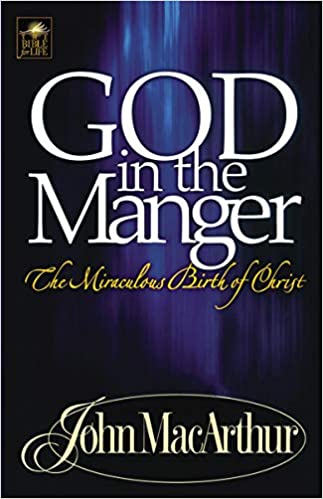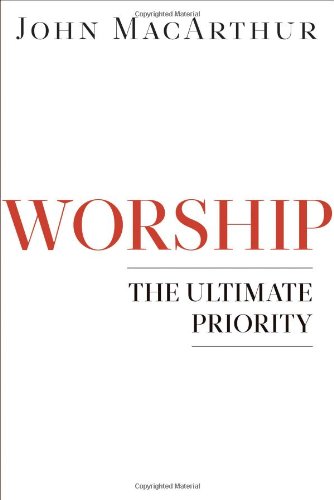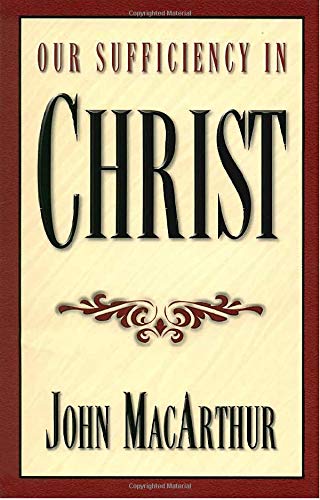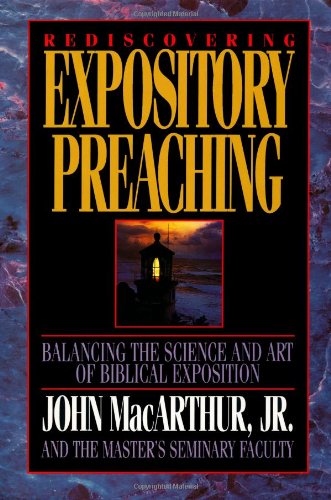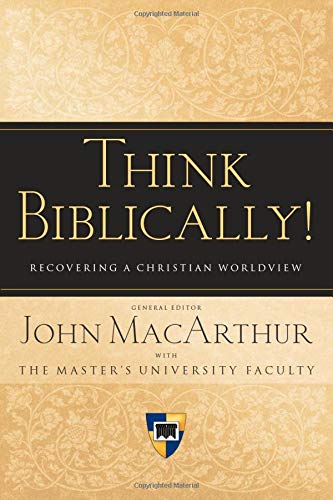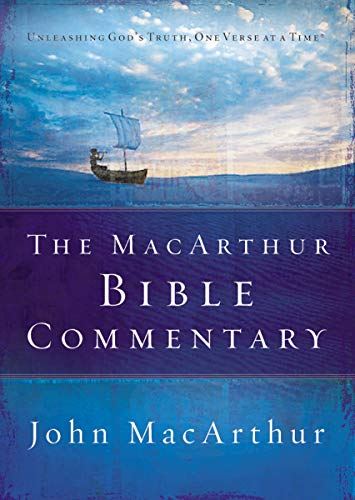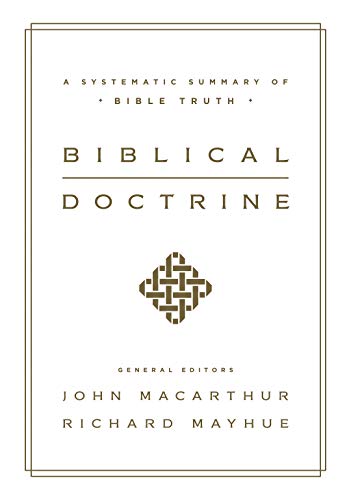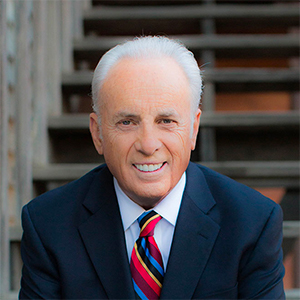
Quotes by John MacArthur
To be filled with the Spirit is to live in the consciousness of the personal presence of the Lord Jesus Christ, as if we were standing next to Him, and to let His mind dominate our life. It is to fill ourselves with God’s Word, so that His thoughts will be our thoughts, His standards our standards, His work our work, and His will our will.
God’s way to a successful marriage focuses on what husbands and wives put into it, not on what they can get out of it.
Because modern man is inclined to view himself as merely a higher form of animal – with no divine origin, purpose, or accountability – he is even more disposed to see other people simply as things, to be used for his own pleasure and advantage.
Every individual believer is to stay close to Jesus Christ, faithfully using his spiritual gift in close contact with every believer he touches, and that through such commitment and ministry the Lord’s power will flow for the building up of the Body in love.
What is the New Covenant then? It is the unilateral, irrevocable, unchangeable, eternal promise by God that He will save sinners by forgiving their transgressions and regenerating them from the inside to love Him and obey Him… The New Covenant embodies grace and peace and the Holy Spirit and regeneration and the knowledge of God and the forgiveness of sin and a new heart and pure fellowship with God and love for God. This covenant was personal and individual.
Connecting the Covenantal Dots, Part 2. The article originally appeared (www.gty.org/library/sermons-library/90-434/connecting-the-covenantal-dots-part-2) at www.gty.org. © 1969-2008. Grace to You. All rights reserved. Used by Permission.
In Scripture, the person of God and the Word of God are everywhere interrelated, so much so that whatever is true about the character of God is true about the nature of God’s Word… What a person thinks about God’s Word in reality reflects what a person thinks about God.
God’s Word by John MacArthur and Richard Mayhue taken from Biblical Doctrine by John MacArthur and Richard Mayhue, copyright 2017, Crossway Books, a division of Good News Publishers, Wheaton Illinois 60187, www.crosswaybooks.org. Page 70.
The ultimate end of general revelation is that it leaves people without excuse for failing to recognize the nature of their Creator. But it conveys nothing regarding the way by which a fallen human being might gain access to or secure reconciliation with his Creator to escape judgment. That is why God deemed it necessary to also reveal Himself directly through special revelation. He did it so that fallen humans would know the fullness of God, how to be redeemed from God’s wrath toward sinners, and how to live and please God.
God’s Word by John MacArthur and Richard Mayhue taken from Biblical Doctrine by John MacArthur and Richard Mayhue, copyright 2017, Crossway Books, a division of Good News Publishers, Wheaton Illinois 60187, www.crosswaybooks.org. Page 73.
General Revelation in Scripture [verses] Special Revelation in Scripture: Only condemns/Condemns and redeems. Harmonizes with special revelation but provides no new material/Not only enhances and explains in detail the content of general revelation but also goes significantly beyond that explanation. In its perceived message needs to be confirmed by Scripture/Is self-authenticating and self-confirming in its claim to be God’s Word. Needs to be interpreted in light of special revelation/Needs no other revelation to be interpreted since it interprets itself. Is never equated with Scripture by Scripture/Has no peer.
God’s Word by John MacArthur and Richard Mayhue taken from Biblical Doctrine by John MacArthur and Richard Mayhue, copyright 2017, Crossway Books, a division of Good News Publishers, Wheaton Illinois 60187, www.crosswaybooks.org. Page 75.
In the end result, that which was written [in the Bible] was fully the words of the human authors in their language and style and from their personal perspectives, but it was under the direct superintendence of God by his Spirit producing on the page the very words of God.
God’s Word by John MacArthur and Richard Mayhue taken from Biblical Doctrine by John MacArthur and Richard Mayhue, copyright 2017, Crossway Books, a division of Good News Publishers, Wheaton Illinois 60187, www.crosswaybooks.org. Page 79.
The process of inspiration at no point in time violates the personality, language, or style of the human author. Indeed, it includes all these elements as well as the immediate historical context in which the text was written. God prepared the human authors to be used as his instruments for the composition of His own Word.
God’s Word by John MacArthur and Richard Mayhue taken from Biblical Doctrine by John MacArthur and Richard Mayhue, copyright 2017, Crossway Books, a division of Good News Publishers, Wheaton Illinois 60187, www.crosswaybooks.org. Page 83.
God did not inherit His authority—there was no one to bequeath it to Him. God did not receive His authority—there was no one to bestow it on Him. God’s authority did not come by way of an election—there was no one to vote for Him. God did not seize His authority—there was no one from whom to steal it. God did not earn His authority—it was already His.
God’s Word by John MacArthur and Richard Mayhue taken from Biblical Doctrine by John MacArthur and Richard Mayhue, copyright 2017, Crossway Books, a division of Good News Publishers, Wheaton Illinois 60187, www.crosswaybooks.org. Page 101.
The church can affirm the authority of Scripture, but it cannot be the ultimate witness to it… That proof must be the testimony of Scripture itself.
God’s Word by John MacArthur and Richard Mayhue taken from Biblical Doctrine by John MacArthur and Richard Mayhue, copyright 2017, Crossway Books, a division of Good News Publishers, Wheaton Illinois 60187, www.crosswaybooks.org. Page 103.
The internal testimony of the Holy Spirit illuminates the believer so that he knows that the Scriptures are the Word of God. The biblical basis for this clarity is derived from two sources. First, the words of Scripture are self-attesting because they claim to be from God (2 Tim. 3:16; 2 Pet. 1:20–21). Second, the Holy Spirit’s dynamic power applies the truth of Scripture, resulting in a confident assurance in the Word itself (1 Cor. 2:4–16)… That does not mean that all who hear or read believe (Rom. 10:14–21), but it does mean that those who believe do so because of the convicting and illuminating work of the Holy Spirit.
God’s Word by John MacArthur and Richard Mayhue taken from Biblical Doctrine by John MacArthur and Richard Mayhue, copyright 2017, Crossway Books, a division of Good News Publishers, Wheaton Illinois 60187, www.crosswaybooks.org. Page 104.
What the illuminating work of the Spirit does provide is a receptivity to the authority of God’s Word, a conviction that it is the truthful Word of God, and a capacity aided by the Holy Spirit to discern the true meaning of the Word of God.
God’s Word by John MacArthur and Richard Mayhue taken from Biblical Doctrine by John MacArthur and Richard Mayhue, copyright 2017, Crossway Books, a division of Good News Publishers, Wheaton Illinois 60187, www.crosswaybooks.org. Page 105.
The outworking of God’s authority in Scripture: It is not derived authority bestowed by humans; rather, it is the original authority of God. It does not change with the times, the culture, the nation, or the ethnic background; rather, it is the unalterable authority of God. It is not one authority among many possible spiritual authorities; rather, it is the exclusive spiritual authority of God. It is not an authority that can be successfully challenged or rightfully overthrown; rather, it is the permanent authority of God. It is not a relativistic or subordinate authority; rather, it is the ultimate authority of God. It is not merely a suggestive authority; rather, it is the obligatory authority of God. It is not a benign authority in its outcome; rather, it is the consequential authority of God.
God’s Word by John MacArthur and Richard Mayhue taken from Biblical Doctrine by John MacArthur and Richard Mayhue, copyright 2017, Crossway Books, a division of Good News Publishers, Wheaton Illinois 60187, www.crosswaybooks.org. Page 107.
[Biblical] infallibility means unable to mislead or fail in accomplishing the divinely intended purpose.
God’s Word by John MacArthur and Richard Mayhue taken from Biblical Doctrine by John MacArthur and Richard Mayhue, copyright 2017, Crossway Books, a division of Good News Publishers, Wheaton Illinois 60187, www.crosswaybooks.org. Page 109.
On the one hand, God’s superintendence of Scripture did not compromise the humanness of the authors. On the other hand, the process of inspiration included God’s work of safeguarding the human writers so that they did not err when they were writing his Word – word after word, sentence after sentence.
God’s Word by John MacArthur and Richard Mayhue taken from Biblical Doctrine by John MacArthur and Richard Mayhue, copyright 2017, Crossway Books, a division of Good News Publishers, Wheaton Illinois 60187, www.crosswaybooks.org. Page 108.
Jesus never challenged the accuracy or veracity of a single Old Testament passage. In fact, He never even broached the subject of an errant Scripture because the integrity of the text was always assumed and repeatedly affirmed. Christ never once indicated the slightest need to correct any statement in the Old Testament. Rather, He affirmed its truthfulness to the smallest details (Matt. 5:18; John 10:35).
God’s Word by John MacArthur and Richard Mayhue taken from Biblical Doctrine by John MacArthur and Richard Mayhue, copyright 2017, Crossway Books, a division of Good News Publishers, Wheaton Illinois 60187, www.crosswaybooks.org. Page 110.
God providentially preserves copies and translations to the extent that they accurately reproduce the content of the original autographs… The evidence available today enables textual scholars to hold the confidence that Scripture translations today possess more than 99 percent of the original autographs.
God’s Word by John MacArthur and Richard Mayhue taken from Biblical Doctrine by John MacArthur and Richard Mayhue, copyright 2017, Crossway Books, a division of Good News Publishers, Wheaton Illinois 60187, www.crosswaybooks.org. Page 112.
Over the centuries, three widely recognized principles were used to validate the writings that constituted divine, inspired revelation. First, the writing had to have been authored by a recognized prophet or apostle or by someone associated with one, as in the case of the books of Mark, Luke, Hebrews, James, and Jude. Second, the writing could not disagree with or contradict any previous Scripture. Third, the church had to display a general consensus that a writing was an inspired book.
God’s Word by John MacArthur and Richard Mayhue taken from Biblical Doctrine by John MacArthur and Richard Mayhue, copyright 2017, Crossway Books, a division of Good News Publishers, Wheaton Illinois 60187, www.crosswaybooks.org. Page 119.
It is not the church (or the people of God) that determines which books are inspired by God and are thereby Scripture. The writings themselves are vested with the authority of God on the basis of divine inspiration. They are the Word of God because they were written under the Spirit’s inspiration. The people of God (the church for the New Testament, Israel for the Old Testament) merely recognize the authority present within those writings. Canonicity is based on the fact of inspiration, not the process or agency that did the collecting.
God’s Word by John MacArthur and Richard Mayhue taken from Biblical Doctrine by John MacArthur and Richard Mayhue, copyright 2017, Crossway Books, a division of Good News Publishers, Wheaton Illinois 60187, www.crosswaybooks.org. Page 120.
Since circa AD 350–400, the twenty-seven books of the New Testament have been universally accepted as inspired by God.
God’s Word by John MacArthur and Richard Mayhue taken from Biblical Doctrine by John MacArthur and Richard Mayhue, copyright 2017, Crossway Books, a division of Good News Publishers, Wheaton Illinois 60187, www.crosswaybooks.org. Page 120.
Canonicity refers to the church’s recognition and acceptance of the books of Scripture as God’s inspired Word. The term itself comes from the Greek word kanōn, which originally meant a “reed” or a “rod.” Since a rod was frequently used as a measuring stick, the word began to convey the idea of a “standard” or “rule.”
God’s Word by John MacArthur and Richard Mayhue taken from Biblical Doctrine by John MacArthur and Richard Mayhue, copyright 2017, Crossway Books, a division of Good News Publishers, Wheaton Illinois 60187, www.crosswaybooks.org. Page 120.
Is the canon of Scripture closed? 1. Genesis and Revelation, by their contents, are the perfectly matched bookends of Scripture. 2. Just as there was prophetic silence after Malachi, there has been prophetic silence since John delivered the Book of Revelation. 3. There have not been any authorized apostles or prophets, in the biblical sense, to write God’s inspired Word. 4. Clear biblical exhortations to not tamper with Scripture (Rev. 22:18-19). 5. The early church, those closest to the time of the apostles, believed that Revelation concluded God’s inspired writings.
God’s Word by John MacArthur and Richard Mayhue taken from Biblical Doctrine by John MacArthur and Richard Mayhue, copyright 2017, Crossway Books, a division of Good News Publishers, Wheaton Illinois 60187, www.crosswaybooks.org. Page 125.
There are over five thousand extant Greek New Testament manuscripts that range in size from the whole New Testament to scraps of papyri that contain as little as a part of a single verse. A few fragments date to within twenty-five to fifty years of the original writing. New Testament textual scholars have generally concluded that over 99 percent of the original writings have been reclaimed, and that of the remaining potentially alternate readings, there are no variants substantially affecting any Christian doctrine.
God’s Word by John MacArthur and Richard Mayhue taken from Biblical Doctrine by John MacArthur and Richard Mayhue, copyright 2017, Crossway Books, a division of Good News Publishers, Wheaton Illinois 60187, www.crosswaybooks.org. Page 127.
Christian doctrine serves as the constitution of godly living. Just as the skeleton is to the body or oxygen is to breathing, doctrine proves indispensable to Christianity. Without Christian doctrine, believers would be stripped of truth in living out the faith.
God’s Word by John MacArthur and Richard Mayhue taken from Biblical Doctrine by John MacArthur and Richard Mayhue, copyright 2017, Crossway Books, a division of Good News Publishers, Wheaton Illinois 60187, www.crosswaybooks.org. Page 131.
[Should] the church forsake the standard of sound doctrine? On what basis would false teachers be rejected (Rom. 16:17; 2 John 9–10) or false doctrine be refuted (Titus 1:9)? How would believers know what was true and worth holding on to (1 Tim. 3:9; Rev. 2:24)? How would Christians distinguish between right and wrong? How would sin be confronted and corrected?
God’s Word by John MacArthur and Richard Mayhue taken from Biblical Doctrine by John MacArthur and Richard Mayhue, copyright 2017, Crossway Books, a division of Good News Publishers, Wheaton Illinois 60187, www.crosswaybooks.org. Page 132.
The preacher needs to realize that God’s Word is not the preacher’s word. He is to recognize himself as a messenger, not an originator (1 Thess. 2:13). He is a sower, not the source (Matt. 13:3, 19). He is a herald, not the authority (1 Tim. 2:7). He is a steward, not the owner (Col. 1:25). He is the guide, not the author (Acts 8:31). He is the server of spiritual food, not the chef (John 21:15, 17).
God’s Word by John MacArthur and Richard Mayhue taken from Biblical Doctrine by John MacArthur and Richard Mayhue, copyright 2017, Crossway Books, a division of Good News Publishers, Wheaton Illinois 60187, www.crosswaybooks.org. Page 133.
[Satan] wants us to laugh at sin rather than mourn over it, and to rationalize it rather than confess it and bring it to the Lord for forgiveness. He seduces us to become so used to sin in us and around us that it no longer bothers our conscience.
Imputed righteousness makes practical righteousness possible, but only obedience to the Lord makes practical righteousness a possibility.
Our job is not to moralize the unconverted; it’s to convert the immoral.
Each of us has one spiritual gift, a blend of the different gifts the Spirit has put together for each of us. Like a painter who is able to create an infinite number of colors by mixing any combination of the ten or so colors he carries in his palette, so the Spirit of God blends a little of one gift with a little of another to create the perfect combination within you. As a result, you have a unique position in the Body of Christ, with an ability to minister as no one else can.
What then is the leader of the church? He is a man with spiritual maturity, spiritual wisdom, spiritual oversight, spiritual authority, who spiritually feeds, spiritually protects people, who provide spiritual discernment of their condition, and spiritual guidance to a better place. That’s the leader.
The Shepherd’s Responsibility. The article originally appeared (http://www.gty.org/Resources/Sermons/52-24) at www.gty.org. © 1969-2008. Grace to You. All rights reserved. Used by Permission.
Nor is it that a believer’s single gift will be restricted to only one category of giftedness. An individual gift may include a number of specific areas of giftedness, in a limitless variety of combinations. Someone with a major gift of administration may also have something of the gifts of helps and of teaching. Believers’ gifts are like snowflakes and fingerprints – each one is completely distinct from all others. Some teachers may emphasize knowledge, some instruction, some mercy, and others exhortation. From the palette of gift colors the Holy Spirit uses the brush of His sovereign design to paint the mixture of each believer so that no two are like.
Christians are not assembly-line productions, with every unit being exactly like every other unit. Consequently, no Christian can replace another in God’s plan. He has His own individualized plan for each of us and has individually gifted us accordingly. We are not interchangeable parts in Christ’s Body.
Not to use our gift is an affront to God’s wisdom, a rebuff of His love and grace, and a loss to His church. We did not determine our gift, deserve it, or earn it. But we all have a gift from the Lord, and if we do not use it, His work is weakened and His heart is grieved.
Attendance is a poor substitute for participation in ministry.
[Gentleness] has nothing to do with weakness, timidity, indifference, or cowardice. It was used of wild animals that were tamed, especially of horses that were broken and trained. Such an animal still has his strength and spirit, but its will is under the control of its master… Meekness is power under control. Biblical gentleness is power under the control of God.
Humility is terribly elusive, because if focused on too much it will turn into pride, its very opposite. Humility is a virtue to be highly sought but never claimed, because once claimed it is forfeited.
Every sinner who repents and turns to Christ adds another spiritual stone to God’s temple, another member to His Body, and becomes another forgiven and cleansed sinner who is made eternally one with every other forgiven and cleansed sinner.
When [the pastor] loses his sense of servanthood, at that same time he loses his spiritual power and usefulness. When he exalts himself and begins to work in his own human power and according to his own plans, he competes with God and forfeits his spiritual power. To lose dependence is to lose everything, because everything that is of any value in our lives, including power for effective service, comes only from the Lord. Among the greatest dangers to the ministry, and to all faithful Christian living, are things that in the world’s eyes are of supreme value – personal ambition, prestige, recognition, honor, reputation, and success.
Because we continue to sin, we need the continued forgiveness of cleansing; but we do not need the continued forgiveness of redemption.
Someone has pictured the divine and human sides of salvation in this way: When you look toward heaven you begin to see a sign that reads, “Whosoever will may come,” and after you enter heaven you look back and see the same sign and read on the other side, “Chosen in Him before the foundation of the world.”
Faith is man’s response to God’s elective purpose. God’s choice of men is election; men’s choice of God is faith. In election God gives His promises, and by faith men receive them.
We cannot sin beyond God’s grace, because as wicked and extensive as our sins might be or become, they will never approach the greatness of His grace.
[The “world” is the system] which men are in basic agreement about what is right and wrong, valuable and worthless, important and unimportant. Sinful men have many different ideas and standards, but they are in total agreement that the network of things in this world is more important than the divine perspective of God. In this most basic world outlook they are of one mind. They resolutely work to fulfill the goals and values of their system, though it defies God and always self-destructs. Sinners are persistent in their rejection, and the worse their system becomes, the more they try to justify it and condemn those who speak the Word of God against it.
Man does not become spiritually dead because he sins; he is spiritually dead because by nature he is sinful [Eph. 2:1].
Salvage yards use giant electromagnets to lift and partially sort scrap metal. When the magnet is turned on, a tremendous magnetic force draws all the ferrous metals that are near it, but has no effect on other metals such as aluminum and brass. In a similar way, God’s elective will irresistibly draws to Himself those whom He has predetermined to love and forgive, while having no effect on those whom He has not.
God’s sovereign election and man’s exercise of responsibility in choosing Jesus Christ seem opposite and irreconcilable truths – and from our limited perspective they are opposite and irreconcilable. That is why so many earnest, well-meaning Christians throughout the history of the church have floundered trying to reconcile them. Since the problem cannot be resolved by our finite minds, the result is always to compromise one truth in favor of the other or to weaken both by trying to take a position somewhere between them. We should let the antimony remain, believing both truths completely and leaving the harmonizing of them to God.
Wisdom is the skill of living a godly life.
Humility is knowing that everything that happened for the good was God, and everything that happened for the bad was you.
Qualities of a Great Missionary, Part 2, The article originally appeared (http://www.gty.org/resources/sermons/1748) at www.gty.org. © 1969-2008. Grace to You. All rights reserved. Used by Permission.
The faithful, effective Christian life, however is not simply a great emotional adventure filled with wonderful feelings and experiences. It is first of all the humble pursuit of God’s truth and will and of conformity to it. The obedient Christian experiences joy and satisfaction beyond measure, far exceeding that of superficial believers who constantly seek spiritual “highs.” Life in Christ is not sterile and joyless. But true joy, happiness, satisfaction, and all other such feelings are by-products of knowing and obeying God’s truth.
There’s something desperately wrong when an unbeliever feels comfortable in the church. Heaven’s not coming down. The world’s coming in. The church ought to be so unlike the world.
Unless the public sin of a believer is dealt with publicly, people will think the church does not take sin seriously and therefore gives tacit approval of it. A church that does not discipline sinning members (including the most prominent members) loses its credibility, because it does not take seriously its own doctrines and standards. A child who is not disciplined when he does wrong soon concludes that his parent’s standards are not really very important, because they are not enforced.
[Nothing] guarantees biblical success like church discipline. You read that correctly – when it comes to growing a godly, biblical church, purity must be the first priority.
[Church discipline is] vital to the spiritual health and the testimony of the church. Ignoring church discipline is the most visible and disastrous failure of the church in our time, because it conveys to the world that we’re not really serious about sin.
Situation ethics is ungodly ethics. God’s Word, not a given human situation, determines what is right and wrong. Christians do not make truth; and a group of believers, no matter how large or influential – even if they were to be apostle – who take a wrong position or indulge in a wrong practice are still wrong. Neither expediency falsely defined love, nor majority vote have any bearing on truth and righteousness.
Discernment is nothing more than the ability to decide between truth and error, right and wrong. Discernment is the process of making careful distinctions in our thinking about truth. In other words, the ability to think with discernment is synonymous with an ability to think biblically.
What is biblical discernment and why is it important? The article originally appeared (http://www.gty.org/resources/questions/QA138/what-is-biblical-discernment-and-why-is-it-important) at www.gty.org. © 1969-2008. Grace to You. All rights reserved. Used by Permission.
Unfortunately, discernment is an area where most Christians stumble. They exhibit little ability to measure the things they are taught against the infallible standard of God’s Word, and they unwittingly engage in all kinds of unbiblical decision-making and behavior. In short, they are not armed to take a decidedly biblical stand against the onslaught of unbiblical thinking and attitudes that face them throughout their day.
What is biblical discernment and why is it important? The article originally appeared (http://www.gty.org/resources/questions/QA138/what-is-biblical-discernment-and-why-is-it-important) at www.gty.org. © 1969-2008. Grace to You. All rights reserved. Used by Permission.
The greedy materialism of the prosperity gospel turns the biblical gospel on its head. The true gospel is an offer of salvation from sin and spiritual death. The prosperity gospel ignores those eternal realities and falsely promises deliverance from temporal problems like financial poverty and physical sickness. Jesus called His disciples to abandon all, take up their crosses, and follow Him (Luke 9:23). By contrast, the prosperity gospel offers carnal comforts, earthly riches, and worldly success to millions of desperate people who literally buy into it. Whereas the true gospel centers on the glory of God, the prosperity gospel puts man’s wants and desires front and center.
The genuine evidence of the Holy Spirit’s influence in a person’s life is not material prosperity, mindless emotionalism, or supposed miracles. Rather, it is sanctification: the believer’s growth in spiritual maturity, practical holiness, and Christlikeness through the power and leading of the Holy Spirit (as He applies biblical truth to the hearts of His saints). A true work of the Spirit convicts the heart of sin, combats worldly lusts, and cultivates spiritual fruit in the lives of God’s people.
Strange Fire, Copyright © John MacArthur, 2013, p. 56.
Get this book!
The prosperity message unashamedly calls people to place their hope in the passing pleasures of this world. Rather than denouncing wrong desires, it glorifies worldly lifestyles, feeds on sinful greed, and makes poppycock promises to desperate people: “Get right with the Lord and He will give you a well-paid job, a nice house and a new car.” The prosperity gospel is more morally reprehensible than a Las Vegas casino because it masquerades as religion and comes in the name of Christ. But like the casinos, it attracts its victims with glitzy showmanship and the allure of instant riches. After devouring their last cent, like a spiritual slot machine, it sends them home worse off than when they came.
Strange Fire, Copyright © John MacArthur, 2013, p. 59.
Get this book!
The Bible is the Holy Spirit’s book; He inspired it and He empowers it. It is the primary instrument He uses to convict the world of sin (John 16:8–11; Acts 2:37); to point sinners to the Savior (John 5:39; 1 John 5:6); and to conform believers into the image of their Lord (2 Cor. 3:18; 1 Peter 2:2). Accordingly, the Scriptures are described as “the sword of the Spirit.” For believers, that sword is a Spirit-empowered means of defense against temptation (Eph. 6:17); for unbelievers, it is an implement of precision used by the Holy Spirit to pierce hearts of unbelief (Heb. 4:12). A comparison of Ephesians 5:18 with Colossians 3:16 demonstrates that the command to “be filled with the Spirit” is parallel to the command to “let the word of Christ dwell in you richly,” since they both produce the same results (cf. Eph. 5:18–6:9; Col. 3:16–4:1).
Strange Fire, Copyright © John MacArthur, 2013, p. 67.
Get this book!
When the original Pentecostals studied the text of Scripture, they were convinced that tongues in the Bible were authentic foreign languages. But what happened when it became obvious that their modern version of the “gift” did not consist of real languages? If Scripture had been their highest authority, they would have abandoned the practice altogether—recognizing the fact that what they were doing did not match the biblical precedent. Instead, they radically changed their interpretation of the New Testament, manipulating the text in order to justify and preserve a counterfeit. Thus, the clear teaching of Scripture about languages was twisted in order to redefine tongues as nonsensical gibberish and thereby fit the modern phenomenon.
Strange Fire, Copyright © John MacArthur, 2013, p. 72.
Get this book!
Whereas modern “tongues” is a learned behavior consisting of unintelligible stammering and nonsense syllables, the New Testament gift involved the supernatural ability to speak precisely in a foreign language the speaker had never learned. Though charismatics may hijack biblical terminology to describe their practice, the fact remains that such fabricated behavior has no relation to the biblical gift.
Strange Fire, Copyright © John MacArthur, 2013, p. 137.
Get this book!
It was wrong then, and still is, to selfishly seek any spiritual gift when we’ve been told that spiritual gifts are sovereignly chosen and distributed by the Holy Spirit. It is especially wrong to crave a gift we don’t have out of self-serving or prideful motives.
Strange Fire, Copyright © John MacArthur, 2013, p. 147.
Get this book!
The genuine gift endowed a person with the miraculous ability to speak in unlearned foreign languages for the sake of proclaiming the Word of God and authenticating the gospel message. When used in the church, it had to be translated so other believers could be edified by the message. By contrast, the modern charismatic version consists of nonmiraculous, nonsensical gibberish that cannot be translated. It is a learned behavior that does not correspond to any form of authentic human language. Rather than being a tool to edify the church, contemporary charismatics use the fabrication as a private “prayer language” for the purpose of self-gratification. Though they justify their practice because it makes them feel closer to God, there is no biblical warrant for such unintelligible babble. It is a false spiritual high with no sanctifying value. The fact that modern glossolalia parallels pagan religious rites should serve as a dire warning of the spiritual dangers that can be introduced by this unbiblical practice.
Strange Fire, Copyright © John MacArthur, 2013, p. 154.
Get this book!
A Roman seal conveyed authenticity, security, ownership, and authority. And the Spirit of God represents those same realities in the lives of His children. Those who have received the Holy Spirit can rest assured that they are truly saved (authenticity) and that their salvation can never be lost or stolen from them (security). Moreover, the Spirit’s presence in their lives demonstrates that God is their Lord and Master (ownership). As they are led by the Spirit, they will manifest a life of submissive obedience to Christ (authority). All this is part of the Spirit’s sealing work.
MacArthur
Strange Fire, Copyright © John MacArthur, 2013, p. 193.
Get this book!
When we consider the New Testament epistles, where believers are given prescriptive instruction for church life, we find that being filled with the Spirit is demonstrated not through ecstatic experiences but through the manifestation of spiritual fruit. In other words, Spirit-filled Christians exhibit the fruit of the Spirit, which Paul identifies as “love, joy, peace, longsuffering, kindness, goodness, faithfulness, gentleness, self-control” (Gal. 5:22–23). They are “led by the Spirit” (Rom. 8:14), meaning their behavior is directed not by their fleshly desires, but by the sanctifying power of the Holy Spirit.
Strange Fire, Copyright © John MacArthur, 2013, p. 204.
Get this book!
Obeying the command to be filled with the Spirit does not involve emotional hype or mystical encounters. It comes from reading, meditating on, and submitting to the Word of Christ, allowing the Scriptures to permeate our hearts and minds. Said another way, we are filled with the Holy Spirit when we are filled with the Word, which He inspired and empowers. As we align our thinking with biblical teaching, applying its truth to our daily lives, we come increasingly under the Spirit’s control.
Strange Fire, Copyright © John MacArthur, 2013, p. 206.
Get this book!
To be filled with the Spirit…is to yield our hearts to the authority of Christ, allowing His Word to dominate our attitudes and actions. His thoughts become the object of our mediation, His standards become our highest pursuit, and His will becomes our greatest desire. As we submit to God’s truth, the Spirit leads us to live in a way that honors the Lord.
Strange Fire, Copyright © John MacArthur, 2013, p. 206.
Get this book!
Significantly, spiritual gifts are not the sign of being Spirit-filled. Sanctification is. As believers are sanctified—coming under the Spirit’s control—they are equipped to use their spiritual gifts effectively for the purpose of serving others.
Strange Fire, Copyright © John MacArthur, 2013, p. 206.
Get this book!
As the New Testament makes clear, being a “Spirit-filled” Christian has nothing to do with uttering mindless gibberish, crashing to the carpet in a hypnotic trance, or any other mystical encounter of supposed ecstatic power. Rather, it has everything to do with submitting our hearts and minds to the Word of Christ, walking in the Spirit and not the flesh, and daily growing in love and affection for the Lord Jesus unto the service of His whole body, the church.
The Reformation was the inevitable and explosive consequence of the Word of God crashing like a massive tidal wave against the thin barricades of man-made tradition and hypocritical religion. As the common people of Europe gained access to the Scriptures in their own language, the Spirit of God used that timeless truth to convict their hearts and convert their souls. The result was utterly transformative, not only for the lives of individual sinners, but for the entire continent on which they resided.
Strange Fire, Copyright © John MacArthur, 2013, p. 213.
Get this book!
As those godly men were carried along by the Holy Spirit, He superintended their words and used them to produce the Scriptures. As a sailing ship is carried along by the wind to reach its final destination, so the human authors of Scripture were moved by the Spirit of God to communicate exactly what He desired. In that process, the Spirit filled their minds, souls, and hearts with divine truth— mingling it sovereignly and supernaturally with their unique styles, vocabularies, and experiences, and guiding them to produce a perfect, inerrant result.
Strange Fire, Copyright © John MacArthur, 2013, p. 223.
Get this book!
The doctrine of illumination does not mean that believers can unlock every theological secret (Deut. 29:29), or that we do not need godly teachers (Eph. 4:11–12). It also does not preclude us from disciplining ourselves for the purpose of godliness (1 Tim. 4:8) or from doing the hard work of careful Bible study (2 Tim. 2:15). Yet we can approach our study of God’s Word with joy and eagerness—knowing that as we investigate the Scriptures with prayerfulness and diligence, the Holy Spirit will illuminate our hearts to comprehend, embrace, and apply the truths we are studying.
Strange Fire, Copyright © John MacArthur, 2013, p. 226.
Get this book!
Without His divine empowerment, preaching the gospel would be nothing more than dead letters falling upon dead hearts.
Strange Fire, Copyright © John MacArthur, 2013, p. 227.
Get this book!
The Bible is the Holy Spirit’s book! It is the instrument He uses to convict unbelievers of sin, righteousness, and judgment. It is the sword by which He energizes the proclamation of the gospel, piercing the hearts of the spiritually dead and raising them to spiritual life. It is the means by which He unleashes His sanctifying power in the lives of those who believe, growing them in grace through the pure milk of biblical instruction.
Strange Fire, Copyright © John MacArthur, 2013, p. 229.
Get this book!
Any honest evaluation of the New Testament evidence reveals that the apostles were a unique group of men, hand-picked and personally commissioned by the Lord Jesus Himself to lay the doctrinal foundation for the church, with Christ as the cornerstone. No one alive today can possibly meet the biblical criteria required for apostleship. And even in the first century, when all agree the miraculous gifts were fully operational, only a very select group of spiritual leaders were regarded as apostles.
First, it would be impossible for any contemporary Christian to meet the biblical qualifications required for someone to be considered an apostle. The New Testament articulates at least three necessary criteria: 1. an apostle had to be a physical eyewitness of the resurrected Christ (Acts 1:22; 10:39–41; 1 Cor. 9:1; 15:7–8); 2. an apostle had to be personally appointed by the Lord Jesus Christ (Mark 3:14; Luke 6:13; Acts 1:2, 24; 10:41; Gal. 1:1); and 3. an apostle had to be able to authenticate his apostolic appointment with miraculous signs (Matt. 10:1–2; Acts 1:5–8; 2:43; 4:33; 5:12; 8:14; 2 Cor. 12:12; Heb. 2:3–4).
People who want to see miracles today should stop following fake healers and start engaging in biblical evangelism. To see a spiritually dead sinner made alive in Christ Jesus by the power of the Spirit is to witness an actual miracle of God.
There can be no repentance or faith until the heart has been re-created. But in the moment of regeneration, the Holy Spirit imparts the gift of repentant faith to sinners – bringing them to saving faith in Christ and enabling them to turn away from sin. The result is a dramatic conversion.
Nothing is more offensive to the Author of Scripture than to disregard, deny, or distort the truth He has revealed (Rev. 22:18–19). To mishandle the Word of God is to misrepresent the One who wrote it. To reject its claims is to call Him a liar. To ignore its message is to snub that which the Holy Spirit inspired.
It is a sad twist of irony that those who claim to be most focused on the Holy Spirit are in actuality the ones doing the most to abuse, grieve, insult, misrepresent, quench, and dishonor Him. How do they do it? By attributing to Him words He did not say, deeds He did not do, phenomena He did not produce, and experiences that have nothing to do with Him. They boldly plaster His name on that which is not His work.
The…fixation with the Holy Spirit’s supposed work is false honor. Jesus said, “When the Helper comes, whom I shall send to you from the Father, the Spirit of truth who proceeds from the Father, He will testify of Me” (John 15:26). So when the Holy Spirit becomes the focal point of the church’s message, His true work is undermined.
The Holy Spirit – the glorious third member of the Trinity – is no less God than the Father or the Son. Thus, to dishonor the Spirit is to dishonor God Himself. To abuse the Spirit’s name is to take God’s name in vain. To claim He is the one who empowers self-willed, whimsical, and unbiblical worship is to treat God with contempt. To turn the Spirit into a spectacle is to worship God in a way that He deplores.
Preoccupied with mystical encounters and emotional ecstasies, [many] seek ongoing revelation from heaven – meaning that, for them, the Bible alone is simply not enough. [With them], biblical revelation must be supplemented with personal “words from God,” supposed impressions from the Holy Spirit, and other subjective religious experiences. That kind of thinking is an outright rejection of the authority and sufficiency of Scripture (2 Tim. 3:16–17). It is a recipe for far-reaching theological disaster.
I…remind you what the true ministry of the Holy Spirit looks like. It’s not chaotic, flashy, and flamboyant (like a circus). It’s usually concealed and inconspicuous (the way fruit develops). We cannot be reminded too often that the Holy Spirit’s primary role is to exalt Christ, especially to elicit praise for Christ from His people. The Spirit does this in a uniquely personal way, first of all by reproving and convicting us – showing us our own sin, opening our eyes to what true righteousness is, and making us sense deeply our accountability to God, the rightful Judge of all (John 16:8–11). The Holy Spirit indwells believers, empowering us to serve and glorify Christ (Rom. 8:9). He leads us and gives us assurance of our salvation (vv. 14–16). He prays for us with groanings too deep for words (v. 26). He seals us, keeping us secure in Christ (2 Cor. 1:22; Eph. 4:30). The Spirit’s daily presence is the source and the secret of our sanctification as He conforms us to the image of Christ.
It is not the convicting work of the Holy Spirit that is drawing converts, but the allure of material possessions and the hope of physical healing.
The notion that spiritual warfare involves direct confrontation with demons is foreign to Scripture. Christians who verbally confront demons waste energy and demonstrate ignorance of the real war. We are not called to convert demons, but sinners. The battle is rather with the false ideologies men and demons propagate so that the world believes them. Doomed souls are inside their fortresses of ideas, which become their prisons and eventually their tombs – unless they are delivered from them by belief in the truth.
Spiritual warfare is an ideological conflict, fought in the mind by assaulting the proud fortresses of ideas that sinners erect against the truth.
Satan is most effective in the church when he comes not as an open enemy, but as a false friend; not when he persecutes the church, but when he joins it; not when he attacks the pulpit, but when he stands in it.
Sadly, many evangelical churches today deny in practice the sufficiency of God’s grace for all of life’s problems, supplementing it with the humanistic theories of psychology. The idea that the grace of God is sufficient for even the most serious issues believers may face is derided as antiquated, simplistic, and naïve, like putting a Band-Aid on a broken leg. It is suggested by so-called Christian psychologists that divine grace may be sufficient for solving shallow problems, but deeper issues require therapy.
It is when believers are out of answers, confidence, and strength, with nowhere else to turn but to God that they are in a position to be most effective. No one in the kingdom of God is too weak to experience God’s power, but many are too confident in their own strength. Physical suffering, mental anguish, disappointment, unfulfillment, and failure squeeze the impurities out of believers’ lives, making them pure channels through which God’s power can flow.
While all miracles are supernatural acts of God, not all supernatural acts of God are miracles.
[According to 2 Cor. 8-9, financial] stewardship with integrity, then, is marked by voluntary, faithful giving, proportionate to what one has, in submission to godly pastors who silence the critics by handling the money faithfully. It is motivated by exemplary love for God and others, and is completely free from selfish greed and covetousness. All giving must be measured by those noble standards.
A spiritual war, however, cannot be successfully fought with fleshly weapons. Therefore, the weapons in Paul’s arsenal were not those of human ingenuity, human ideology, or human methodology. Human reason, wisdom, plans, strategies, organizations, skill, eloquence, marketing, religious showmanship, philosophical or psychological speculation, ritualism, pragmatisms, or mysticism are all ineffective weapons against the forces of the kingdom of darkness, the “powers…world forces of this darkness…[and] spiritual forces of wickedness in the heavenly places” (Eph. 6:12). They cannot rescue sinners from the “domain of darkness” (Col. 1:13) or transform believers into Christ’s likeness. Such weapons gain only superficial, temporary, and deceptive victories at best.
The price of refusing to forgive is high. Unforgiveness produces hatred, bitterness, animosity, anger, and retribution. It not only clogs up the arteries but also the courts with thousands of vengeful lawsuits. Refusing to forgive imprisons people in their past. Unforgiving people keep their pain alive by constantly picking at the open wounds and keeping it from healing. Bitterness takes root in their hearts and defiles them (Heb. 12:15). Anger rages out of control and negative emotions run unchecked. Life is filled with turmoil and strife instead of joy and peace.
The issue is not the skill of the one proclaiming the message, the packaging of the message, or the technique used in proclaiming it. The issue is the condition of the hearer. Jesus illustrated that principle in the parable of the sower. The same message (the seed) is proclaimed by the same individual (the sower); the only variable is the condition of the four soils. What is essential for the messengers of the gospel is not cleverness but clarity. Only God can open the sin-blinded eyes of those who are “dead in [their] trespasses and sins” (Eph. 2:1; cf. v. 5; Matt. 8:22; Eph. 4:18).
By using frail, fallible people, God makes it clear that the power lies not in the human messenger but in the divine message. God’s power transcends the limitations of the “clay pot.” And it is precisely those limitations that allow Christians to experience the greatest demonstration of God’s power.

